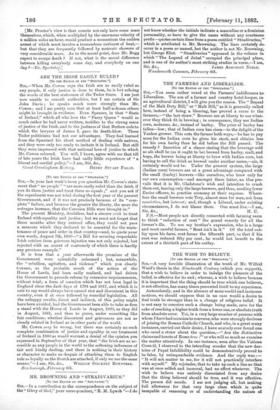[TO THE EDITOR OF THE " SPECTATOR."]
SIR,—In your last week's issue you question Mr. Cowen's state- ment that " no people " " are more easily ruled than the Irish, if you do them justice and treat them as equals ;" and you ask if the experiment was not tried during the first year of the present Government, and if it was not precisely because of its " com- plete " failure, and because the greater the liberty, the more the outrages increase, that the Coercion Bills were brought in."
The present Ministry, doubtless, had a sincere wish to treat Ireland with equality and justice ; but we must not forget that three months after they entered office, they could not pass a measure which they declared to be essential for the main- tenance of peace and order in that country—and, to quote your own words, August 7th, 1880—" a Bill for securing respectable Irish cottiers from grievous injustice was not only rejected, but rejected with an accent of contumely of which there is hardly any previous example."
It is true that a year afterwards the promises of the Government were splendidly redeemed ; but, meanwhile, the "rebellion, agitation, and violence" which you clearly foresaw, as the probable result of the action of the House of Lords, had been sadly realised, and had driven the Government to precede reform by extensive imprisonments, without trial ; a form of coercion which has not been legal in England since the dark days of 1794 and 1817, and which it is safe to say would always have caused riot and discontent in this country, even if at once followed by remedial legislation. All the unhappy results, direct and indirect, of this policy might have been avoided, had the Government been able to take as firm a stand with the House of Lords in August, 1880, as they did in August, 1881, and thus to prove, under something like fair conditions, whether discontent and grievances are not as closely related in Ireland as in other parts of the world.
Mr. Cowen may be wrong, but there was certainly no such complete combination of justice and equality in our treatment of Ireland in 1880 as would warrant a denial of the opinion you expressed in September of that year, that " the Irish are as ac- cessible as any people in the world to the softening influences of fair and kindly dealing, and there is nothing in their history or character to make us despair of attaching them to English rale as loyally as the Scotch are attached, if only we use the same














































 Previous page
Previous page